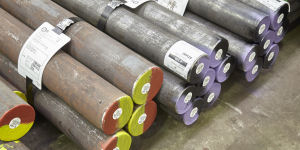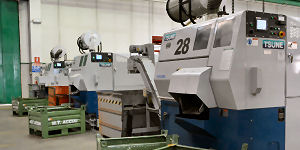Subcategories
Case-hardening steels
Case-hardening steels are employed for the fabrication of mechanical parts that have to be hardened through heat treatments of carboncementation, carbonitriding, followed by quenching and tempering, so that you can obtain a hard surface, characterized by toughness and resistance at heart.
Not only an excellent resistance at heart, but also a high mechanical wear resistance is obtained.
To obtain elevated toughness, steels with a high percentage of nickel will be preferred.
Case-hardening steels are employed to build gears, shafts, linchpins, mechanical parts for the adaptors sector, industrial, automotive and mechanical parts in general.
The eligibility of the case-hardening treatment depends on the steel's quality, on the austenitic grain size that is formed during the treatment and on the percentage of carbon and alloy elements, which change for each quality.
Quenched and tempered steels
Quenched and tempered steels are mainly employed for components that require specific characteristics in order to handle not only high mechanical stresses, but also deflection, strain, compression-shear and twist.
The ability to resist to mechanical stresses must be combined with high toughness that allows to avoid fractures for brittleness.
For those parts that are destined to power transmission, it is also required a good wear resistance and a good resistance to dynamic stresses.
Chemical composition and heat treatment are strictly connected with steel's micro-structure and its employment.
The yield strength and the elastic limit depend on the material's structure after hardening and on the tempering temperature; wear resistance is obtained by carrying out a superficial hardening or nitriding treatment.
ELIGIBILITY FOR HEAT TREATMENT
Quenched and tempered steels must have an adequate hardenability as a function of the mechanical characteristics that are to be obtained after a heat treatment. It is important to know the Jominy curve of the steel that you would like to employ.
All out steels have a controlled and certified hardenability.
Machinability
They are steels destined to the production of parts that require demanding processes. machinability becomes essential for what concerns the economic aspect.
Machinability depends on hardness, inclusion, chemical composition, micro-structure and toughness. It is improved by the presence of sulphur, lead, selenium and sometimes they are treated with calcium.
CHOICE CRITERIA FOR QUENCHED AND TEMPERED STEELS
Turnings removal is generally the most expensive operation, for this reason it is necessary to take into account steels with an improved machinability, in order to save time during processing.
The mechanical characteristics, which will have to be obtained, will be evaluated in terms of steel hardenability and in this way hardness and tensile strength of finished parts will be evaluated.
It is fundamental that heat treatment is carried out in the best way, so that a correct micro-structure and relative mechanical characteristics can be obtained.
Nitriding steels
They are quenched and tempered steels with a chemical composition that has an addition of aluminium, chromium, molybdenum, vanadium. In contact with nitrogen they form hard nitrides.
They have an excellent wear resistance and abrasion resistance, combined with an improvement in corrosion resistance in aggressive environments. For all these characteristics they are preferred over case-hardening steels, but also for the low number of deformations that come from the nitriding treatment.
HARDENABLITY
Jominy hardenability demonstrates that they are steels with an excellent hardenability, some are tougher, for example 34CRALMO7, whereas 41CRALMO7 has an excellent superficial hardness.
For what concerns reliability and functionality, you can obtain a hardened superficial layer that can vary from 0,05 yo 1 mm, considering an increase in the fragility related to the nitriding thickness.
Hardness that you obtain from the nitriding heat treatment is more elevated than the one you obtain from case-hardening steels and hardened steels.
Spring steels
The main properties of a spring steel are those of bearing an intermittent load, accumulating energy and measuring forces.
It must have an elastic deformation without plastic alteration, so the yielding unit load shall be elevated and this is achieved after an adequate quenching and tempering.
Spring steels must have an elevated hardenability, verified with the Jominy hardenability that allows to calculate martensite at heart that you can obtain, which has to be at least 80%.
In order to get a better elasticity and a high elastic limit, spring steels must have a fine grain to be less sensible to overheating.
They must have an elevated tensile strength and fatigue strength, combined with plastic reserve, consequently toughness is diminished.
Inclusions and superficial defects have to remain within restricted limits. Steels with SI, CR and NI have an elevated elastic limit and a great hardenability. They are employed for springs and twist bars.












